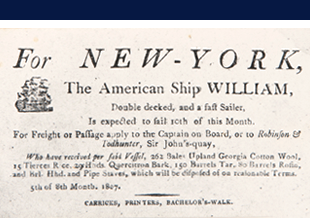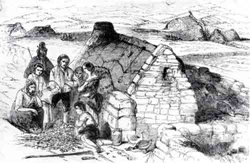
STORY OF EMIGRATION
To all intents and purposes, emigration from Co. Clare began with the dreadful famine of 1822 which followed a disastrous harvest in 1821. To understand the background to this emigration, some statistics and changing circumstances should be noted. In 1821 the population of Co. Clare was 208,089 having doubled during the previous twenty years.
This explosion was a rural phenomenon and continued until the mid-1840s.
What sustained this dense rural population? Since 1792 vast tracts of mountain land were reclaimed. People felt that the potato on which they subsisted could never fail. A family of six persons could be maintained on less than one acre of ground.
With the rising population tenants, invariably without the consent of their landlords, sublet and subdivided their farms into two or three acre holdings which provided sustenance
Article by Dr. Naoise Cleary, Founder of Clare Heritage & Genealogy Centre
for landless sons and neighbours. The Napoleanic wars also inflated agricultural prices, which were good for landlord and tenant and provided employment for subtenants, cottiers and labourers. People had no apprehension of poverty. Consequently early marriages took place and children were regarded as being of little or no burden.

After the peace of 1815, rural Ireland underwent a transition period. The collapse of the war boom tumbled grain prices. Landlords were still demanding war rents after peace prices had returned. This led to conflict, tenants were unable to meet the demands being made on them. Many resident landlords were in dire economic straits. They sought a solution to their problems through consolidating the small farms into large tillage holdings or into pasture land for the grazing of cattle. This pushed thousands of families off the land and demolished their habitations.
The disastrous famine of 1882 was especially severe in Clare. Daniel O'Connell in a letter to his wife, dated 4th May 1882 states: 'All are actually starving in Co. Clare and nearly so in Kerry.
The distress is extreme and the want spreading.' Any emigration resulting from this famine generally ended up on Merseyside, with Irish labourers building docks, water ways, public buildings and factories in Lancashire and beyond. Read full article ▶
Commission a Family History Report Order Now
